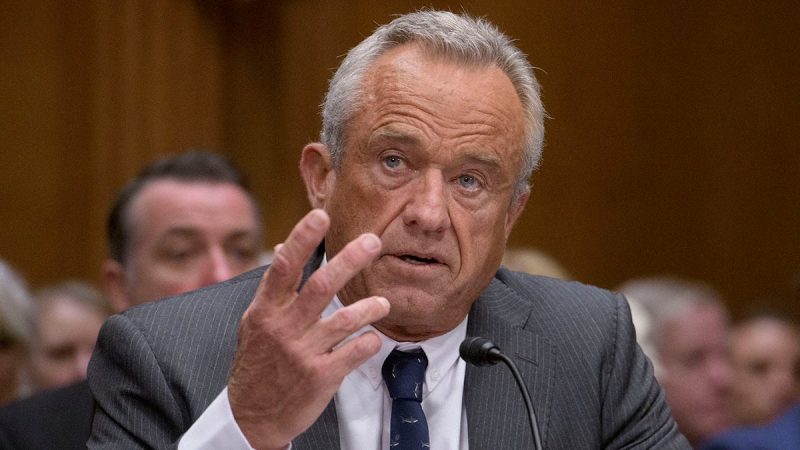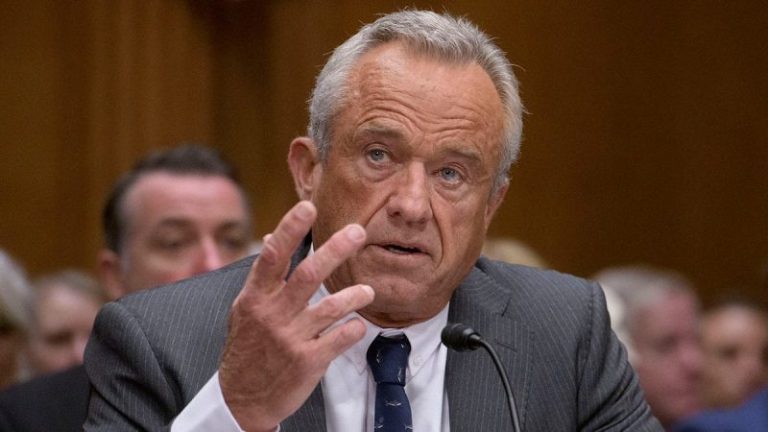
The Senate voted Wednesday to advance Robert F. Kennedy Jr.’s controversial nomination to serve as Health and Human Services (HHS) secretary in President Donald Trump’s Cabinet, sending him on a path to final confirmation.
The vote to invoke cloture on Kennedy’s nomination ends debate and starts the clock ticking toward the final Senate vote on his confirmation.
The Senate agreed to advance the nomination by a party-line, 53-47 vote.
Kennedy, the well-known vaccine skeptic and environmental crusader who ran for the White House in 2024 before ending his bid and endorsing Trump, needed a simple majority to advance to a final vote in the chamber, which Republicans control by a 53-47 majority.
Kennedy survived back-to-back combustible Senate confirmation hearings late last month, when Trump’s nominee to lead 18 powerful federal agencies that oversee the nation’s food and health faced plenty of verbal fireworks over past controversial comments, including his repeated claims in recent years linking vaccines to autism, which have been debunked by scientific research.
During the hearings, Democrats also spotlighted Kennedy’s service for years as chair or chief legal counsel for Children’s Health Defense, the nonprofit organization he founded that has advocated against vaccines and sued the federal government numerous times, including a challenge over the authorization of the COVID-19 vaccine for children.
With Democrats on the Senate Finance Committee voting not to advance Kennedy, the spotlight was on Sen. Bill Cassidy, R-La., a physician and chair of the Senate Committee on Health, Education, Labor and Pensions (HELP).
Cassidy issued a last minute endorsement before the committee level vote, giving Kennedy a party-line 14-13 victory to advance his confirmation to the full Senate.
Cassidy had emphasized during Kennedy’s confirmation hearings that ‘your past of undermining confidence in vaccines with unfounded or misleading arguments concerns me,’ which left doubt about his support.
However, after speaking again with the nominee, Cassidy rattled off a long list of commitments Kennedy made to him, including quarterly hearings before the HELP Committee; meetings multiple times per month; that HELP Committee can choose representatives on boards or commissions reviewing vaccine safety; and a 30-day notice to the committee, plus a hearing, for any changes in vaccine safety reviews.
‘These commitments, and my expectation that we can have a great working relationship to make America healthy again, is the basis of my support,’ the senator said.
Earlier this week, another Republican senator who had reservations regarding Kennedy’s confirmation announced support for the nominee.
‘After extensive public and private questioning and a thorough examination of his nomination, I will support Robert F. Kennedy Jr., to be the Secretary of Health and Human Services,’ moderate GOP Sen. Susan Collins, R-Maine, announced on Tuesday.
Another Republican who was on the fence, Sen. Lisa Murkowski of Alalska, also voted to advance Kennedy’s nomination.
‘I continue to have concerns about Mr. Kennedy’s views on vaccines and his selective interpretation of scientific studies, which initially caused my misgivings about his nomination,’ Murkowski said in a statement.
But Murkowski added that Kennedy ‘has made numerous commitments to me and my colleagues, promising to work with Congress to ensure public access to information and to base vaccine recommendations on data-driven, evidence-based, and medically sound research. These commitments are important to me and, on balance, provide assurance for my vote.’
Kennedy, whose outspoken views on Big Pharma and the food industry have also sparked controversy, has said he aims to shift the focus of the agencies he would oversee toward promotion of a healthy lifestyle, including overhauling dietary guidelines, taking aim at ultra-processed foods and getting to the root causes of chronic diseases.
The push is part of his ‘Make America Healthy Again’ campaign.
‘Our country is not going to be destroyed because we get the marginal tax rate wrong. It is going to be destroyed if we get this issue wrong,’ Kennedy said as he pointed to chronic diseases. ‘And I am in a unique position to be able to stop this epidemic.’
The 71-year-old scion of the nation’s most storied political dynasty, launched a long-shot campaign for the Democratic presidential nomination against then-President Joe Biden in April 2023. However, six months later, he switched to an independent run for the White House.
Trump regularly pilloried Kennedy during his independent presidential bid, accusing him of being a ‘Radical Left Liberal’ and a ‘Democrat Plant.’
Kennedy fired back, claiming in a social media post that Trump’s jabs against him were ‘a barely coherent barrage of wild and inaccurate claims.’
However, Kennedy made major headlines again last August when he dropped his presidential bid and endorsed Trump. While Kennedy had long identified as a Democrat and repeatedly invoked his late father, former Sen. Robert F. Kennedy, and his late uncle, former President John F. Kennedy – who were both assassinated in the 1960s – Kennedy in recent years built relationships with far-right leaders due in part to his high-profile vaccine skepticism.
After months of criticizing him, Trump called Kennedy ‘a man who has been an incredible champion for so many of these values that we all share.’
Trump announced soon after the November election that he would nominate Kennedy to his Cabinet to run HHS.

